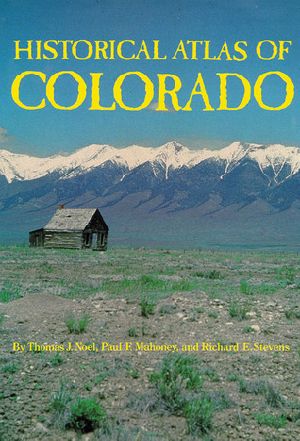Historical Atlas of Colorado

- Authors
- Noel, Thomas J. & Mahoney, Paul F. & Stevens, Richard E.
- Publisher
- University of Oklahoma Press
- Tags
- test , history
- ISBN
- 9780806125916
- Date
- 1993-11-01T00:00:00+00:00
- Size
- 8.21 MB
- Lang
- en
This unique historical atlas will help you to comprehend quickly Colorado’s geography and its fascinating past—from the prehistoric Indian cultures to the modern metropolises, from the Spanish and French explorers to the modern ski resorts. The full-page, clearly drawn maps and the lively text provide easy access to the essential information about the Highest State.
Colorado’s history has been played out on a spectacular landscape. The highest mountains of the continental divide cut the state in half with a two-mile-high barrier. This rocky obstacle long served as a tribal and international boundary and as an impediment to exploration and settlement. All that changed in 1858 when gold was discovered on the South Platte River. Within two years, 100,000 people rushed to Colorado, the home of instant cities and instant millionaires. Quickly, the state evolved from a most rugged and remote frontier into a booming mining and agricultural center.
Compiled by three leading authorities on Colorado history and geography, this atlas is designed for both students and tourists. Scholars will profit from the maps of little-known phenomena such as the earliest county lines and the explorers’ routes. Weekend tourists will learned to follow old trails, stagecoach lines, and narrow-gauge railroads to ghost towns, historic districts, literary landmarks, quaint bed-and-breakfasts, and other attractions.
For easy use, the atlas is well organized into sections on geography, political boundaries, mining, transportation, settlement and urbanization, and recreational and historic areas. The extensive references for each of the sixty maps are a gold mine of detailed and esoteric literature. No Colorado traveler, whether in an armchair or hiking back country, should be without the Historical Atlas of Colorado.